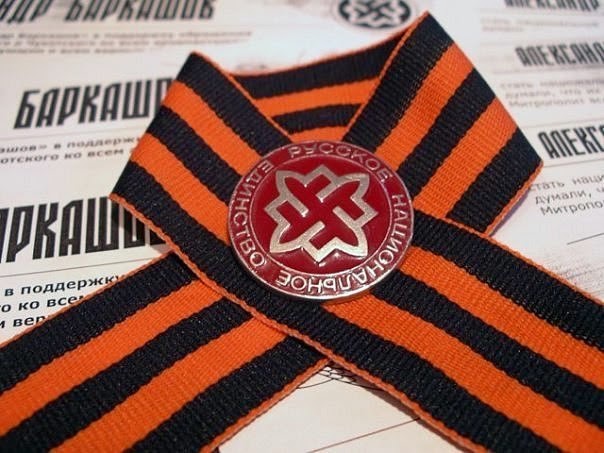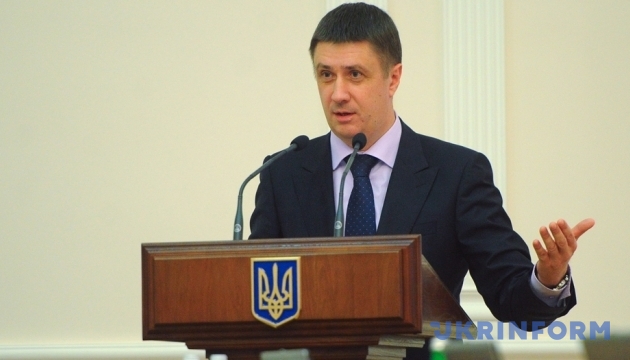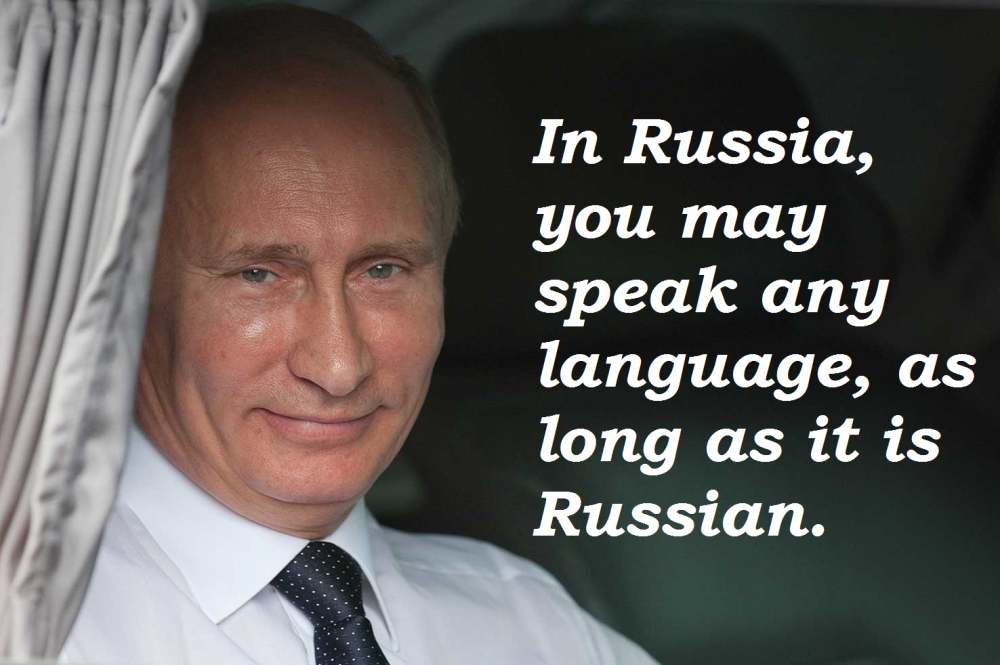It is amazing but true: language is what separates us. So say several Russian-speaking Ukrainians. And they say we need to look for what unites us.
Well, we have looked for it carefully these past 25 years. And finally we found something after all. The slogan "Putin khuilo" (vulgar reference to Putin - Ed.), the view that Russia is the aggressor, and the vyshyvanka (embroidered shirt). At least we can organize successful parades.
But a good third of the population is still exhibiting Soviet mentality, which we are fighting, according to Poroshenko. A good half still believes in friendship between Russia and Ukraine, not realizing that it will always be friendship between the rabbit and the boa. Because the boa will never accept the existence of an independent Ukraine.
A good example of that is the new concept of Russian history, developed in four volumes by Yevgeny Spitsyn, which has become the foundation of all Russian history books. In fact, there is very little new there because we already have all the ossified imperial myths and prejudices that have been generously seasoned by Soviet ideology. A spot was found even for our pseudo-historian P. Tolochko, who is presented as the only sober Ukrainian historian without "Banderite (nationalist -- ED.) trash."
A boa will simply never forget its instincts to grab. It does not matter that certain boas may mumble something unintelligible about our friendship and that we should live in peace; others will have a different idea, namely the following:
"Banderite Nazism in European clothing is sneaking around the country. After having crushed and broken so many, it is now trying to attract young, talented and ambitious people, who are numerous there," Russian commentator Vladimir Sukhomlinov wrote in the recent Literary Gazette. He added that "the (Ukrainian) regime is ready, as the Nazis were earlier, to bring a 'new order' to the 'barbarians from the East.' This kind of evil cannot be cured; it can only be strangled at birth," he concluded.
Therefore we have the appeal to "reach Kyiv." Especially since this is the "mother of cities" where, according to Spitsyn, there were no Ukrainians. And if there were no Ukrainians there, then millions of current students, having grown up, will always be ready to march in the next crusade.
Russian propaganda has distorted the recent statement by Ukraine's Minister of Culture Yevhen Nyshchuk about genetics and identity to such an extent that Goebbels can rest easy: "The Minister of Culture of Ukraine said recently that in Donetsk, Zaporizhzhia, and even in Cherkassy there was not enough genetic material to work with," Sukhomlinov wrote. "This disciple of Goebbels implies that there are 'no people' living there. After that how can one claim that there is 'no fascism in Ukraine'?" he concluded. (Nyschchuk said the lack of national consciousness in parts of the Donbas was the result of Stalin's policy of resettling large numbers of ethnic Russians to replace the ethnic Ukrainians that had been murdered during the Holodomor and other repressions -- Ed.)
But what I like most was how he criticizes empty opposition, stating that "even the odious Nadiya Savchenko in her desperate courage will challenge anyone."
Therefore, what we treat as nonsense he considers courage."
But let us return to what separates us. It is language. And here again we have the assertion that Ukrainization must be mild.
At this point one is tempted to ask if it should be as mild as Russification or even milder? And should it also be extended to last more than 300 years? I'm afraid that at this rate we will turn into the last of the Mohicans.
After we had been destroyed physically and mentally, any talk about mild Ukrainization is not appropriate. We have not seen any mild Balticization in the Baltic states. But somehow the Russian speakers managed to adapt.
The Ukrainization of the 1920s was not mild. It was very short-lived. And then all the representatives of Ukrainian culture were shot, including the linguists and the writers. And even though the Ukrainization did not last long, everyone had accepted it. What's more, there was a large influx of non-Ukrainians to Ukrainian literature (Liber Rabinovych, Liutsianna Piontek, Ivan Kulyk, Hryhorii Epik, Aron Kopshtein, Samiilo Shchupak, Andrii Khvylia, Leonid Pervomaiskyi, Davyd Kanevskyi, Raisa Troianker, Volodymyr Zorin, Andrii Rozenkrants, Mykhailo Tykhonov and many others). Not to mention those who came from mixed families, such as M. Khvylovyi or Mike Johansen.
The number of Ukrainian writers of non-Ukrainian origin that enlisted in the ranks of Ukrainian culture during the very short period of Ukrainization significantly surpassed the small cohort of writers who have chosen the Ukrainian language during the 25 years of independence.
Therefore, the current Ukrainization is not simply mild but super-mega-mild. Because the results are rather vague.
Attempts to separate from the Russian World in print as well as in audio and video productions are received with misunderstanding and mockery. Because, supposedly, it is impossible to avoid Russian culture and the people really want it. However, we have no solid research regarding the number of Ukrainians who cannot live without Russian culture. However, we do have various manipulations.
And these manipulations have very deep roots. Similarly in the 1880s the "prominent" "Ukrainian" pedagogue Khrystyna Alchevska produced the book "What should people read?" where she outlined reading recommendations based on various opinions.
Here I must clarify that, unlike her daughter, she was not a Ukrainian pedagogue. She did not know the Ukrainian language and additionally she communicated with rather suspicious types and relied on their tastes for her recommendations, which were exclusively Russian classics. This gave rise to the conclusion that Ukrainians simply cannot exist without them.
Borys Hrynchenko, who attended her lessons and paid close attention to the people whose thinking she found authoritative, commented: "and these are the people: a former lackey (now a wealthy man, brother of the officer), a former cook, a rich farmer, a graduate of the county urban school, a crook who spent many periods in prison, a literate cobbler, a security guard, several female toadies, two or three real peasants, though touched by civilization (and this means that they read cheap Russian popular literature, to which many Russian classical writers had contributed -- Yu. V.). And she thought that if these kinds of people who speak some unintelligible language understand books (we're speaking of Russian books) then the entire Ukrainian people will understand them. And if we add that Alchevska herself did not know Ukrainian and often wrote down what she heard in Russian and then relied on some available person to translate it into Ukrainian, then you can imagine how much everything she wrote corresponded to reality.
But, meanwhile, Russian propaganda still does not forget to mention Alchevska and to use her writings to prove the cultural unity of our people and the permanence of taste.
Language should not divide us but unite us. As it once united the Czechs in an independent Czechoslovakia, and later the Jews in an independent Israel, where the spread of Hebrew did not occur mildly, because if it had occurred mildly who knows where it would have ended. And now the Israelis are not concerned that many arrivals from Soviet lands do not know Hebrew because Hebrew has won on all the cultural fronts.
We are very far from such a victory.
_______________
Yuriy Vynnychuk is one of Ukraine's most prominent and versatile writers. He has produced a wide variety of literary works, including poetry, novels, short stories and plays, as well as numerous essays on political and historical topics. His highly acclaimed novel Tango of Death received the 2012 BBC Ukrainian Book of the Year Award.





